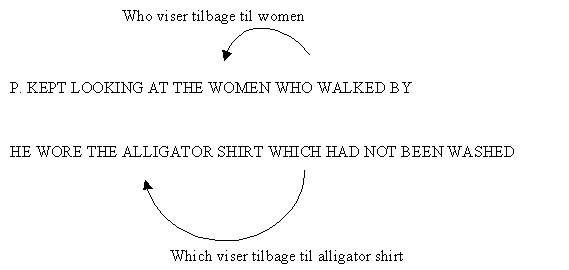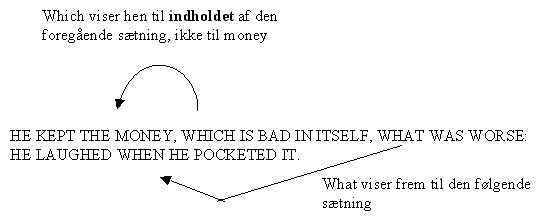
15. HENFØRENDE STEDORD (RELATIVE PRONOMINER)
 |
a. Der bruges who om personer: "She told me about Jones, who had lived there for years". Der bruges which om ting: "I took 4 photos which were immediately sent to the administrator". That bruges om både personer og ting, og det bruges i definerende/bestemmende relativsætninger: "He was the man that I told you about". I den stilling kan det ofte udelades: "He was the man I told you about"
b. Vises der tilbage til indholdet af en foregående sætning, bruges også which: There was a delay of 1 hour, which was bad
 |
c. What viser frem til indholdet af en følgende sætning…. "But what was worse, they took it quite calmly".
d. Whose (hvis) er ejefald af det relative pronomin: Mr. Johnson, whose property had been stolen, was very angry.
e. Når et relativpronomen er genstandsled (objekt), sættes ofte –m endelse på: "He looked at the man who(m) they had tried to kill". Som direkte styrelse for en præposition: "The ring had been given to her by Andrew, with whom Karen was in love".
Undersøg brugen af relativpronominer i sætningerne herunder:
"The administration I'll bring is a group of men and women who are focused on what's best for America, honest men and women, decent (anstændige) men and women, women who will see service to our country as a great privilege and who will not stain (tilsmudse) the house." -Des Moines Register debate, Iowa, Jan. 15, 2000
Hvad viser which hen til i følgende sætning?:
"Thirdly, the explorationists (de, der laver olieefterforskning) are willing to only move equipment (udstyr) during the winter, which means they'll be on ice roads, and remove the equipment as the ice begins to melt, so that the fragile tundra is protected."—Conestoga, Pa., May 18, 2001
Understreg den rigtige form af
relativpronominet:
There was something for Peter’s wife,
who/which/that would be appointed director of the center. The company would
also give her a car who/which/that had been purchased two years ago. There
would also be something for the campaign manager who/whose company was going to
paint the house. Peter, who/which/that had always been somewhat envious of the
upper class, was happy to get this opportunity, who/which/that he felt he
deserved. There was one problem, however, there was an old grocery story
who/which/that would need to be purchased by the center.
Understreg et korrekt
relativpronomen og sæt kommaer omkring relativsætninger, hvor det er
nødvendigt:
At West
Springfield who/which/that is a middle class high school parents decided they
wanted to send the Class of 2000 off in style, so they raised nearly $60,000
for its graduation party who/which/that was to last all night. They hired Pat
McGee’s Band who/which/that is a Richmond group with several major-label
recordings to its credit, and gave out door prizes such as televisions, bikes
and stereos who/which/that were donated by shops in the area.
Much of the money was raised by parents’
employees who/which/that were sometimes working overtime to accomplish the
feat, and parents themselves who/which/that collected money by fund-raising and
hard local work. Lon Naylor who/which/that is the school's PTA president this
year, recalls hawking hot dogs, nachos and beer during a hot day at Nissan to
help boost the party fund.
"It was very much exaggerated,"
he who/which/that was tireless said. "You don't need to spend 40-, 50- or
60-thousand dollars to have a great party. . . . This year, we've vowed to scale back"—to about
$25,000.
In the case of the Great
Falls playground who/which/that also came about through local initiative
parents had to raise a large sum on their own in order to go forward because
the project was not on the county's priority list. Marketing plan in hand,
Miniter McKay and her friends canvassed the neighborhood of 6,000-square-foot
homes, offering parents the chance to immortalize their children's names in bronze
for $100 a pop. The moms also identified five levels of donations, from
$100 to $5,000, and promised
inscriptions for those donors who/which/that also wanted to be immortalized.
The linchpin of the strategy was an alliance with the Optimist International
Foundation who/which/that helped the parents raise money as a tax-exempt group
and provided administrative help, insurance and other assistance. "It
allowed us to really field major donors in a way that they felt their money
would be handled properly," Miniter McKay said.
The response was overwhelming. One
"well-known family" who/which/that wished to remain anonymous gave
$10,000, she said, and a high-tech executive
committed $10,000 of his company's stock, who/which/that, by the time
the deal closed, had gone up $1,600. But most of the money came in smaller, if
not small, donations, Miniter McKay said. Some larger families donated hundreds
of dollars to have the names of all their children included. It's the most I've
ever seen raised for any project in my district," said Supervisor Stuart
Mendelsohn (R-Dranesville), who/which/that helped the parents meet with Park
Authority and Optimist representatives. "There's no question that this
community can afford to do it." The names of donors and their children
have been engraved on two bronze plaques who/which/that attached to two granite
stones at the entrance to the new playground. The original plan called for a
single stone but there were so many names for the plaque it would have required
a four-ton slab of granite. The sign company didn't have a crane large enough
to hoist it.
Oversæt teksterne til engelsk:
Interaktiv øvelse med relativpronominer